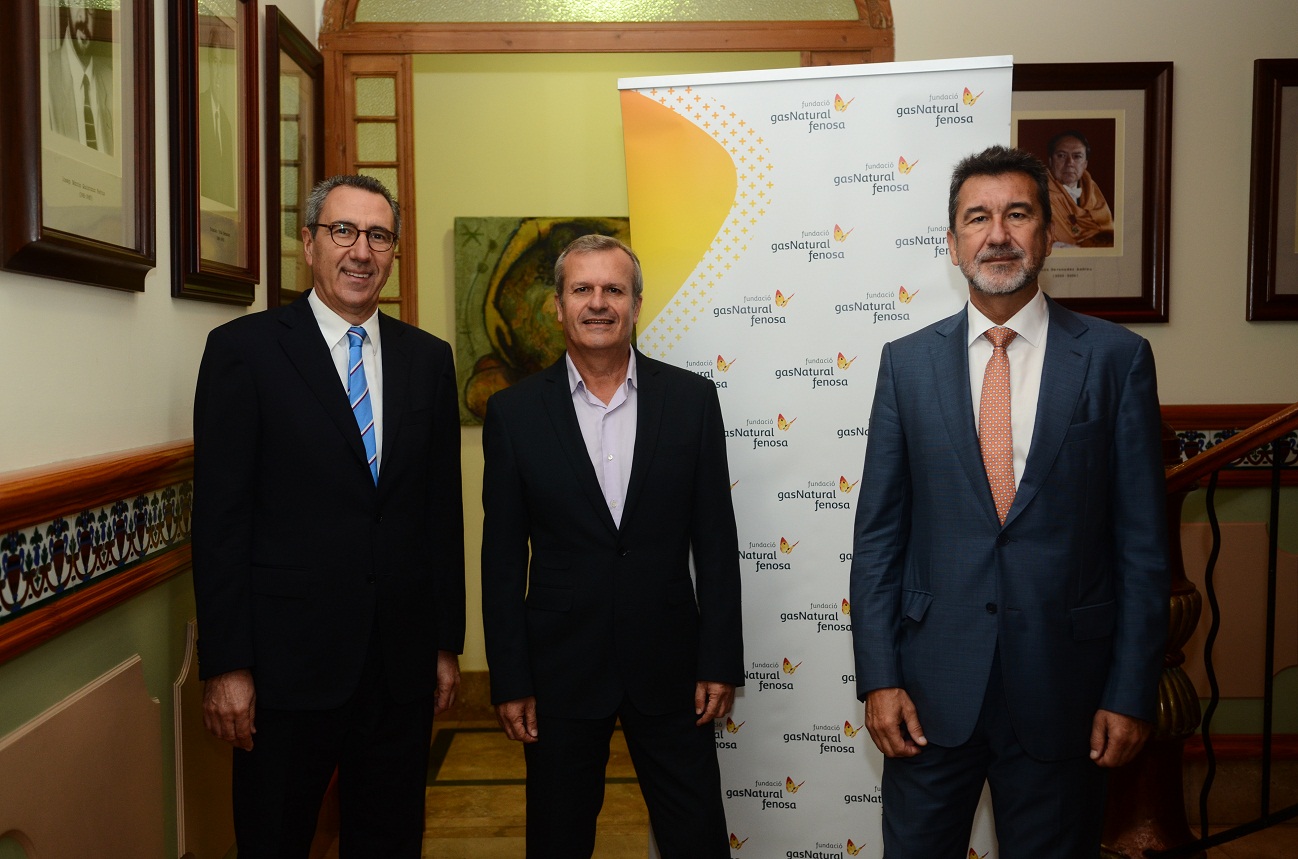Gas Natural Fenosa explains the opportunities to be gained from installing natural gas in the Balearic Islands
The power group’s distribution subsidiary plans to invest approximately 30 million euros in Menorca to offer a gas supply to a total of 20 towns on the island.
At a seminar organised today in Maó by the Gas Natural Fenosa Foundation and the Regional Government of the Balearic Islands, various experts discussed the economic, environmental, technological and social advantages of bringing natural gas to the islands.
Through its foundation, GAS NATURAL FENOSA promotes information, training and increased public awareness on improving energy efficiency and technological innovation in the field of energy.

Earlier today, the Councillor for Regional Affairs, Energy and Mobility of the Regional Government of the Balearic Islands, Joan Boned, the President of the Island Council of Menorca, Maite Salord, and the Managing Director of the Gas Natural Fenosa Foundation, Martí Solà, officially opened the seminar entitled Natural Gas in Menorca: a new energy, at which the process to bring and develop natural gas in Menorca was explained and the economic, environmental, technological and social advantages of bringing this energy to the Balearic Islands were presented. The event was also attended by the Managing Director of Regulated Businesses for GAS NATURAL FENOSA, Antoni Peris, and the Director of Gas Distribution Business Spain, José María Gil Aizpuru.
At the seminar, which was attended by over 100 professionals from companies, engineering firms, universities and public authorities, the speakers explained the opportunities provided by natural gas, including its domestic and industrial uses, as well as its importance for the transport sector, and highlighted its potential as a way of supporting renewable energies.
The Director of New Towns and Infrastructure Projects of Gas Natural Distribución, Juan Manuel Belda, explained that the distribution subsidiary of GAS NATURAL FENOSA will invest close to 30 million euros to bring the gas network to various towns in the eight municipalities on the island (Alaior, Ciutadella, Es Castell, Es Migjorn, Ferreries, Maó, Es Mercadal and Sant Lluís), as well as the industrial estates and main tourism hubs (Son Bou, Cala en Porter, Cala'n Bosch, Sa Caleta-Santandria-Cala Blanca, Cala'n Blanes, Sant Tomas, Cala Galdana, Sant Climent, Fornells, Coves Noves, S'Algar and Binibeca).
The project provides for three distribution zones taking gas from storage centres located in Maó, Ciutadella and Es Mercadal. The design of the gas infrastructure plan thus prioritises speed in the rollout of the network via these modern, efficient and flexible plants that will enable service to be provided to a total of 55,876 homes on the island.
Gas: key to the economic revitalisation and industrial competitiveness of Menorca
Development of the island’s gas network will improve energy infrastructure in the various municipalities, providing a more competitive source of energy to homes, businesses and industries. Implementation of the gas infrastructure project will provide an economic boost to companies already operating on the island and will enable the creation of new jobs – both directly and indirectly – in pipe laying, installation and sales activities, among others.
Gas distribution activity continues to play a key role in industrial competitiveness and economic revitalisation. The gas sector, which accounts for 0.5% of GDP in Spain, generates around 150,000 jobs across the value chain, from transport and distribution to the provision of services to end customers.
Commitment to the Balearic Islands
The commitment from Gas Natural Distribución includes an investment of up to 42 million euros between now and 2020 to supply natural gas to more than 25 municipalities in other parts of the Balearic Islands, enabling it to initially serve more than 120,000 potential customers. Besides the eight municipalities in Menorca, the company has submitted gas supply licensing projects in other towns, including Alcúdia – Port d’Alcúdia – Platja d’Alcúdia, Capdepera-Cala Rajada, Pollença-Port de Pollença, Muro, Sóller i Port de Sóller on the Island of Majorca.
Through its distribution companies, Gas Natural Fenosa is the leading natural gas distribution group in Spain. It currently has over 5.2 million supply points and 48,900 kilometres of distribution network in the 1,157 municipalities of the 11 autonomous regions where it operates. At the end of 2017, the regional distribution companies of GAS NATURAL FENOSA will be providing their services to over six million supply points in Spain.
The policy adopted by the Regional Government of the Balearic Islands
The Director-General for Energy and Climate Change of the Regional Government of the Balearic Islands, Joan Groizard, explained that the arrival of natural gas in Menorca, which will be a reality in less than one year, will provide immediate benefits in terms of the environment, economy and the fight against climate change. He also highlighted the role of natural gas as a “transitional energy” and said that the public authorities and the sector should work together to speed up emissions reduction and total energy consumption, as well as increase energy efficiency.
The event was also attended by the Mass Market Offer/Products and New Construction Manager of Gas Natural Distribución, Jesús Hernández, the Director for Catalonia and the Balearic Islands of Saunier Duval, José Montero, the partner from Cabot Proyectos S.L.P., Antoni Vila, the Director for Engineering and the Environment of the Madrid Municipal Transport Company, Juan Ángel Terrón, and the Director for the Tertiary Market and Energy Solutions of GAS NATURAL FENOSA, Josep Lluís Lloret.
The Gas Natural Fenosa Foundation
The Gas Natural Fenosa Foundation, founded in 1992, targets its activity at the promotion of information, training and increased social awareness on improving energy efficiency and technological innovation in the field of energy while respecting and protecting the environment, and promotes cultural activities through the Gas Museum aimed at preserving and spreading knowledge about the historical and cultural heritage of the sector. It also has a programme to support exports for small and medium-sized enterprises. Its international operations take place in Algeria, Argentina, Brazil, Colombia, Costa Rica, Italy, Mexico, Morocco, Moldova and South Africa.
Mahón (Spain), 08 Oct 2015
Share